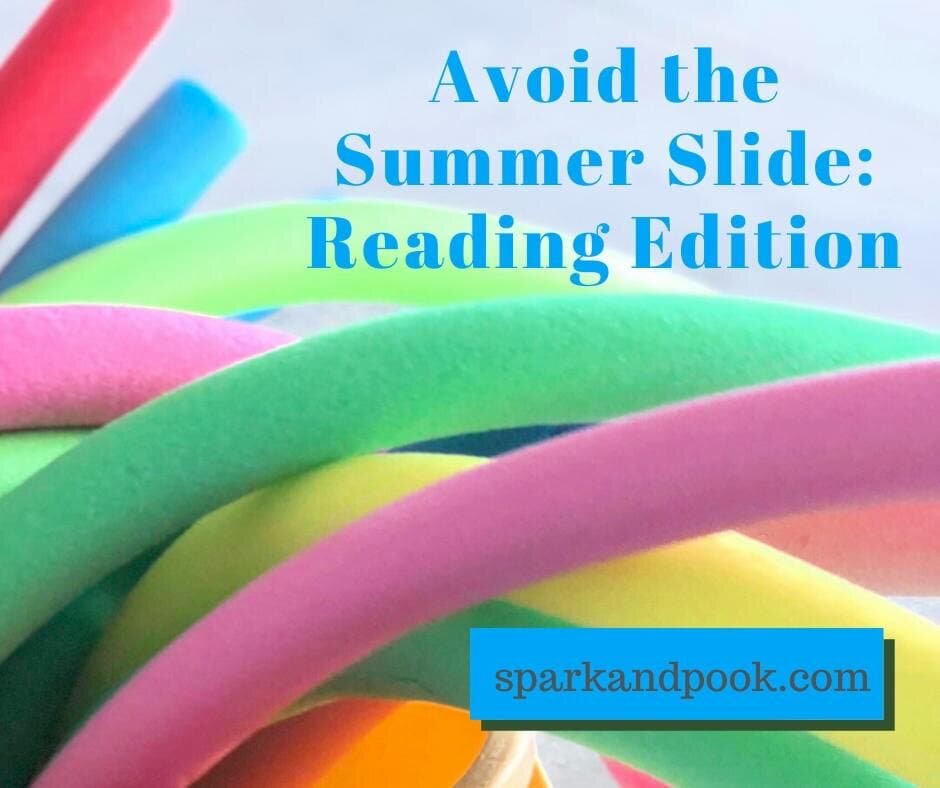Use these tips to Beat the Summer Slide - Reading Edition
Keep your kids’ minds sharp and avoid the summer slide.
What is the summer slide?
In a nutshell: “use it or lose it.”
More specifically, it's the dip in a child’s academic abilities that often occurs at the end of summer vacation. It mainly refers to reading skills and math skills, but can also include writing skills. Spelling would be a part of that as well.
Why does it matter?
Nobody wants their child starting off the school year at a disadvantage. If their math and reading skills are rusty, they may not perform as well as their peers, and will progress more slowly through the curriculum. This will most likely have a negative affect on their self-esteem and belief in their academic abilities.
Avoid the summer slide, and set your child up for success by working on academic skills in fun and realistic settings to keep their mind sharp.
This article would be way too long if I tried to cover everything at once. I’m breaking it up into three parts; Reading, Math, and Writing.
This post focuses on ways to avoid the summer slide in Reading.

This post may contain affiliate links.
Read, Read, Read!
Children who spend time reading perform better academically all the way around.
In the early years, this should include parents reading to their children. Then as the child is able, he/she should do more of the reading, but the parent should still be participating. And later, the child can read independently, but the parent should stay involved by asking questions about what the child read.
How do you incorporate reading into your summer?
Make it fun!
- Earn prizes - The summer reading program at your local library is probably the best way to do this. There is usually an easy way to track books or minutes read in order to earn prizes. (or make your own book goals)
- Meet an author - Keep tabs on the calendar of your local bookstore. If there’s a children’s book author visit happening soon, consider reading some of their books to stir up interest before going and meeting the author. (or follow along with virtual author read-alouds)
- Go on a book hunt - Seek out little neighborhood “libraries” and scavenge through them for a “new” book. Hit up several of them until you each find a book you want to read. Return the favor by cleaning out your own bookshelves at home and adding them to the little library. (Also book hunt at yard sales and thrift stores.)
- Take a trip to the bookstore - Make it a special occasion, and let the kiddo(s) pick out a new book to buy (possibly to take on an upcoming trip).
- Change location - Take the kids and their books outside to read. Make it a picnic too. Adding novelty of any sort to the situation makes it more fun.
- Read to someone else - look for community reading programs (or create your own) where kids can read to volunteers, to animals or to the elderly, etc.
- Listen to a story - Some kids enjoy following along while listening to the story. Seeing the words in print while hearing them aloud is a great way to improve a child’s reading skills. You can find these books at the library and bookstore as well as by ordering through Scholastic or Amazon. Even just listening to stories without seeing the words will engage some comprehension skills. Look for story podcasts or try Audible for kids.
- Branch out - Remember, reading skills can be applied to more than just traditional books. Graphic novels and comic books are fun and still require kids to use comprehension skills. Reading books online can also add interest. Check out your library’s website or sites like EPIC.
- Order a book box subscription - There are many subscription boxes available these days. One of our favorites is KidArtLit, which provides a craft that goes along with the book.
- Do research for an outing - Are you going on a trip? or on an outing to see an upcoming exhibit? Try to find some children’s books on that topic to read together in preparation for your visit.
- Start a book club with friends. Friends or family members can read the same book and then get together (even if just virtually) to celebrate it. (Charlotte's Web is always a winner.)
If you have been struggling with finding a book your kid enjoys, ask your librarian for suggestions. Also check out my post on Authors for Hesitant Readers.
Keep reading together, and try to keep it fun.
If you found these tips useful, please pin the image below.

